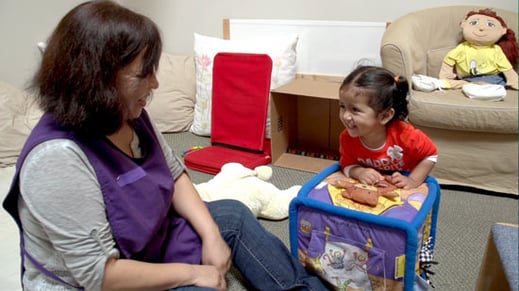
I have to admit, I cringe a little each time I walk into an infant classroom and see a monthly curriculum posted to the bulletin board. Usually it’s filled with age-appropriate activities that any baby would love. But there’s always that moment when I wonder, does this center feel the pressure to focus on pre-academic skills, even for their littlest clients?
So it’s heartening to see that Zero to Three is putting out a series (PDF) aimed at the thoughtful inclusion of infant and toddler classrooms in QRISs (Quality Rating and Improvement Systems). They point out how standards can be written to encourage real quality improvements by incentivizing things like continuity of care, developmental screenings, and, yes, developmentally appropriate curricula. At the core of their recommendations are standards to encourage relationships— relationships between caregivers and babies, between babies as peers, and between caregivers and families.
Centers and caregivers need that message so that they can focus on the things that really matter for babies. Infants grow at an amazing rate, and they have some key developmental tasks:
- Establish trust in their caregivers and their environments
- Will my needs be met? Will my caregivers act in predictable and loving ways? Is my environment safe to explore?
- Use their whole bodies to explore and learn
- What will happen if I throw this? What does that object feel and taste like? Can I get that if I reach for it? How will my caregivers or peers respond when I do this?
- Lay the groundwork for communication
- What sounds can I make? How do my caregivers respond? How does back-and-forth communication work? Can I use a word to ask for that?
Caregivers do their most important work when they help infants meet these early goals. They do that by engaging in routine care and providing a safe environment, no doubt. But development really takes off when caregivers engage with babies face-to-face, sensitively respond to their individual needs, help them explore their world, and use lots of language and vocalizations along the way.
The core principles in Zero to Three’s new series are closely aligned with the work that my colleagues and I at Teachstone® strive to do. It has been (and will be) wonderful to watch as these principles increasingly make it into policy, as I believe they will; and it will be the advocacy and hard work from groups like Zero to Three to get us there.
Fill out this short form to stay informed about Teachstone's soon-to-be-released Infant CLASS™ resources.

